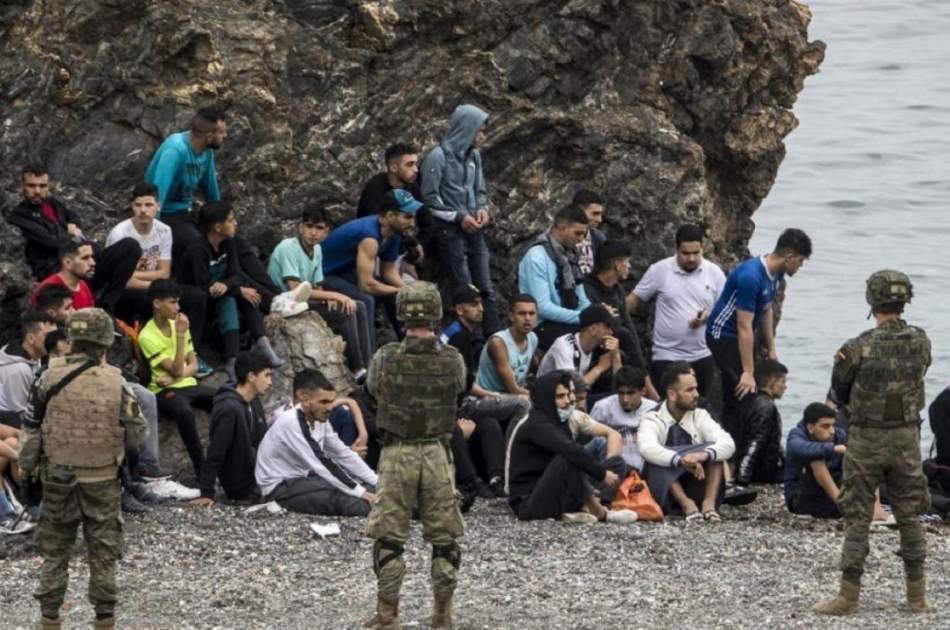After several years of discussions, the European Union member states finally reached an agreement on extensive reforms of immigration policies on Wednesday, December 20. An agreement that was immediately called shameful by human rights defenders and condemned.
Publish dateThursday 21 December 2023 - 10:50
Story Code : 282610
Afghan Voice Agency (AVA) - International Service: The statement of the Council of the European Union states: "The five laws agreed upon by the Spanish Presidency of the Council of the European Union and the European Parliament, include the stages of asylum and immigration management. From the screening of illegal immigrants when they enter the EU, to the registration of biometric data, the procedures for creating and processing asylum applications, the rules for determining which member state is responsible for processing asylum applications, and finally, the cooperation and solidarity between member states in how Dealing with critical situations, including in the cases of making immigrants a tool."
The statement adds: "These laws, after being approved by the national parliaments of the member states, will make the European asylum system more effective and increase solidarity among members by reducing the burden of problems on the member states where most migrants arrive."
The draft of these reforms was proposed by the European Commission in September 2020 to start a new effort to revise the European laws on asylum and immigration after the failure of the previous negotiations in 2016.
According to this law, a new and mandatory screening system will be implemented at all borders and all entries into the EU, border controls will be tightened for migrants entering the EU, and centers near the borders for the faster return of people who do not have the right to asylum.
Criticism of human rights organizations
About 50 NGOs, including Amnesty International, Oxfam, Caritas and Save the Children, wrote an open letter to the deal's negotiators on Monday to warn them of the dangers the migration pact poses and that it will lead to the design of a "bad, costly system".
Damien Carme, a legislator of the French Green Party in the European Parliament, also condemned this agreement and wrote on the "X" social network that despite having "the best values and achievements of Europe in the field of welcoming and supporting exiles", this agreement is a shame.
This agreement was reached shortly after the controversial immigration law was passed in France, which created a new crisis for French President Emmanuel Macron due to the support of French far-right groups.
Accordingly, Damien Carme continued, referring to the French parties, that "the right-wingers, the Macronists and the socialists are coming together for a disgusting pact. Shame on them!" And he added that with this agreement, we will only "fund walls, barbed wire and protection systems across Europe".
Under these reforms, the current rule that the first EU member state an asylum seeker enters is responsible for their case is maintained with some modifications. But to help those Mediterranean countries of the Union where many migrants arrive before any other country, a mandatory solidarity system has been defined, and other member states must help these countries by participating in the relocation of asylum seekers or providing financial support.
The reforms also provide for a border "screening" of migrants upon entry into the Union, and accordingly design a "border procedure" for those who are statistically least likely to receive asylum. These people are temporarily kept in centers near the borders or airports so that they can be returned to their countries of origin or transit more quickly.
The Council of the European Union has emphasized that this procedure should be implemented even for families with children under 12 years old; And while keeping immigrants in these centers is something like detention.
The European Parliament, on the other hand, tried to obtain guarantees regarding the implementation of this mechanism, considering the necessity of respecting the fundamental rights of immigrants; including the issue of the conditions for accepting families with young children and the access of immigrants to free legal advice.
Second agreement for critical situations
The negotiators also agreed on another text for critical and emergency situations, such as those that occurred in 2015 and 2016, in order to have an organized response in the event of a large influx of migrants into an EU country.
According to Euronews, this second agreement foresees the creation of an exceptional system that protects asylum seekers less than usual procedures and possibly increases the duration of their detention at the bloc's external borders.
avapress.net/vdcizrarut1avq2.ilct.html
Tags
Top hits







